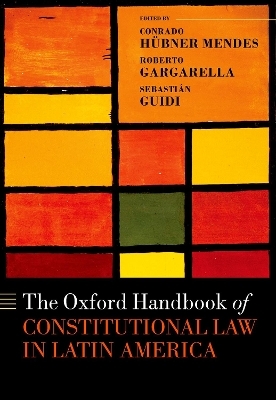
The Oxford Handbook of Constitutional Law in Latin America
Oxford University Press (Verlag)
978-0-19-878690-0 (ISBN)
Constitutional law in Latin America embodies a mosaic of national histories, political experiments, and institutional transitions. No matter how distinctive these histories and transitions might be, there are still commonalities that transcend the mere geographical contiguity of these countries.
This Handbook depicts the constitutional landscape of Latin America by shedding light on its most important differences and affinities, qualities and drawbacks, and by assessing its overall standing in the global enterprise of democratic constitutionalism. It engages with substantive and methodological conundrums of comparative constitutional law in the region, drawing meaningful comparisons between constitutional traditions. The volume is divided into two main parts. Part I focuses on exploring the constitutions for seventeen jurisdictions, offering a comprehensive country-by-country critique of the historical foundations, institutional architecture, and rights-based substantive identity of each constitution. Part II presents comparative analyses on the most controversial constitutional topics of the region, exploring central concepts in institutions and rights.
The Oxford Handbook of Constitutional Law in Latin America is an essential resource for scholars and students of comparative constitutional law, and Latin American politics and history Written by leading experts, it comprehensively examines constitutions, controversies, institutions, and constitutional rights in Latin America.
Conrado Hübner Mendes is Assistant Professor of Public Law at the University of São Paulo. Roberto Gargarella is Professor of Law at the University of Buenos Aires and at Torcuato di Tella University in Buenos Aires. Sebastián Guidi is a JSD candidate at Yale Law School and Adjunct Professor in Universidad Torcuato di Tella.
Part I Constitutions
1: Juan F. González Bertomeu: Argentina
2: Joshua Braver: Bolivia
3: Virgílio Afonso da Silva and Thomaz Pereira: Brazil
4: Domingo Lovera Parmo: Chile
5: Antonio Barreto-Rozo: Colombia
6: Bruce M. Wilson and Olman Rodriguez Loaiza: Costa Rica
7: Julio César Guanche: Cuba
8: Daniela Salazar: Ecuador
9: Francisca Pou Giménez: Mexico
10: Daniel Mendonça y Juan Carlos Mendonça: Paraguay
11: Camila Gianella Malca and Ursula Baertl Espinoza: Peru
12: Gianella Bardazano: Uruguay
13: Ana Cristina Núñez M. and Rogelio Pérez-Perdomo: Venezuela
Part II Constitutional Controversies
A. Comparing Constitutions in Latin America
14: Roberto Gargarella: Latin American Constitutional Traditions
15: Gabriel L. Negretto: Participatory Constitution-Making in Latin America: Consequences for Institutional Design
16: Julio Ríos-Figueroa and Andrea Pozas-Loyo: Authoritarian Constitutionalism
17: Javier Couso: Latin American New Constitutionalism
18: Helena Alviar García: Foreign Capital and Constitutions
B. Institutions
19: Marcelo Alegre and Nahuel Maisley: Presidentialism and Hyper-Presidentialism
20: Fernando Limongi and José Cheibub: Elections
21: Matthew M.Taylor: Courts and Judicial Independence
22: Gretchen Helmke: Courts and Judicial Manipulation
23: Diana Kapiszewski and Katja Newman: Judicialization of Politics
24: Diana Rodriguez Franco and César Rodríguez Garavito: Strategic Litigation and Social Change
25: Luciana Gross Cunha: Access to Justice
26: Marta Arretche: Federalist and Unitary States
27: Gabriela Lotta and Vanessa Elias de Oliveira: Local Government
28: Rogério Arantes and Cláudio Couto: Constitutions and Public Policies
29: Dawisson Belém Lopes and Mario Schettino Valente: Constitutions and Foreign Affairs
30: Alejandro Chehtman: Constitutions and International Law
C. Rights
31: Laura Clérico: Proportionality and Balancing
32: Maria Paula Saffon: Property and Land
33: Ramiro Álvarez Ugarte: Freedom of expression
34: Diego Werneck Arguelhes and Luiz Fernando Marrey Moncau: Privacy
35: Ramiro Álvarez Ugarte: Right to Information and Transparency
36: Deisy Ventura and Camila Baraldi: Immigration and Citizenship
37: Leonardo Avritzer and Cláudia Feres Faria: Political Participation and Democratic Innovation
38: Ángel R. Oquendo: Due Process
39: Maíra Machado: Prisoners Rights
40: Octavio Luiz Motta Ferraz: Equality
41: Isabel Cristina Jaramillo Sierra: Sex Equality
42: Tanya Katerí Hernández: Race Discrimination
43: Daniel M. Brinks: Social Rights
44: Alicia Ely Yamin: The Right to Health
45: Danielle H. Rached and Conrado Hübner Mendes: Environment
46: Agustina Ramón Michel: Abortion
47: Daniel Bonilla Maldonado: Multicultural Constitutions
Part III Comparative Viewpoints
48: Jackie Dugard: A View from South Africa
49: Shylashri Shankar: Judicial Independence in Latin America: A View from Asia
50: Tom Ginsburg: Latin American Constitutionalism: A US Perspective
51: Siri Gloppen: A View from Northern Europe
52: Michaela Hailbronner: A View from Western Europe
53: Latin America: The Shifting Constitutional Continenta
| Erscheinungsdatum | 03.01.2020 |
|---|---|
| Verlagsort | Oxford |
| Sprache | englisch |
| Maße | 178 x 253 mm |
| Gewicht | 1636 g |
| Themenwelt | Geisteswissenschaften ► Geschichte ► Regional- / Ländergeschichte |
| Recht / Steuern ► EU / Internationales Recht | |
| Recht / Steuern ► Öffentliches Recht | |
| Sozialwissenschaften ► Politik / Verwaltung ► Staat / Verwaltung | |
| ISBN-10 | 0-19-878690-5 / 0198786905 |
| ISBN-13 | 978-0-19-878690-0 / 9780198786900 |
| Zustand | Neuware |
| Informationen gemäß Produktsicherheitsverordnung (GPSR) | |
| Haben Sie eine Frage zum Produkt? |
aus dem Bereich


